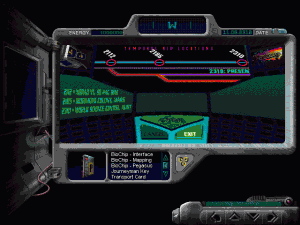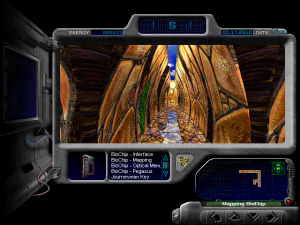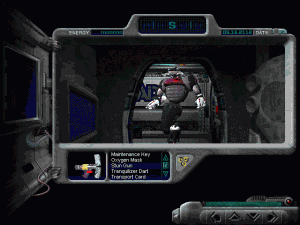The Journeyman Project 
Too many games look at the post-apocalyptic future. What comes after that? The Journeyman Project terrifically answers those bleak predictions with an upbeat one, where goodwill and a shared sense of purpose build past our darkest qualities.
Debuting earlier in the same year as first-person adventure trendsetter Myst, The Journeyman Project offers a more narrative take on the genre. Though it might emphasize inventive puzzles less than its contemporaries, the hopeful thematic strength of its setting helps its delicious sci-fi pulpiness grow into something whole and sublime.
The game unfolds on a post-post-apocalyptic Earth, where the aftermath of a devastating global war gave rise to a utopian “unified world” with the floating city Caldoria as its centerpiece. With the colonization of Mars already complete, society has reached an apex, reaching even further with the discovery of time travel. Government bureaucrats quickly took control of the first experiments, repossessing the only time machine and establishing the Temporal Security Annex to regulate the space-time continuum. The project was codenamed – you guessed it – Journeyman.
Fast-forward to the year 2318. Humanity makes first contact with aliens. A decade later, on the day of Earth’s induction into the galactic Symbiotry of Peaceful Beings, three temporal anomalies threaten to rewrite Earth’s history and turn it into an isolationist, anti-alien stronghold. As TSA agent number five, the only employee to show up for work that day, you get to plunge into the disaster.
The Journeyman Project follows through on the meaty science fiction mystery of that premise. Over the course of the game, you travel via the Temporal Security Annex’s device to four different time zones, most set in future locations at pivotal moments in international relations and scientific history. Each zone usually has one major gimmicky challenge to complete, like a Mastermind-style bomb defusal game, as well as a time-traveling killer robot that needs to be disarmed through whatever means necessary. Other incidental puzzles will require you to use items in your environment, sometimes even elements and objects from a different time period, to advance past some deadly threat. Wire cutters from a Martian construction site, for example, come in handy backstage at an Australian science convention. No puzzles are particularly difficult, though they instill a satisfying sense of mastery of these unknown places. Unique dilemmas often call upon “Biochips,” special programs that Agent 5 can run on his wearable computer such as retinal scanners and mapping systems. The game only uses these for one-off situations, but the Biochip system grounds the practical, futuristic setting better than a standard interface could.
That grounded but idealistic future provides much of The Journeyman Project‘s appeal, in part from how much potential it sees down the road for humanity. Each time period you visit has its own style befitting its stage in human history. Past locations are gritter, less refined works-in-progress; you visit maintenance tunnels and roughed up laboratories with cumbersome equipment. As you go further along the timeline, everything becomes slicker and more polished – and the politics of the era become less fraught. Dark, nuclear-armed outposts eventually turn into global unity conferences with bright lights and radical architecture. By the present day, the elaborate home theater system in your Caldoria apartment alludes to the life of peace and leisure waiting at the end human struggle. This is an authentically charted map of our future that begs to be explored, made more inviting by its wonderful, layered synth soundtrack.
The environments, puzzles, and story meaningfully weave together. When you strap on an oxygen mask to trek into a hazardous mine, you’re not just advancing further into the game: you’re experiencing a world that at once feels futuristic but also somehow part of a distant, historical past. We’re not even close to the year 2185 yet, but in Journeyman‘s idyllic future, its coarse machinery and physical danger still feel like elements of a bygone era. (The game’s pre-rendered graphical style contributes to this too, feeling unstuck in time between a tactile past and glossy fantasy.) The locales and their optional content feel like lived-in spaces rather than environments purposely crafted around the gameplay, as if Journeyman is a documentary of a world to come. Few games in the adventure genre rival this one’s complete vision.
Perhaps best of all, Journeyman‘s vision offers boundless optimism as a response to real wrong in the world. The game positions you in a fight against cynicism – presented in the game as a genuine, organic threat to society – rather than nebulous evil.
Though most your interaction with the villain, time travel inventor Dr. Elliot Sinclair, involves tracking his robots through space, a few scattered video logs give insight in to his thought process. One particularly chilling video near the end reveals that he isn’t trying to destroy the world, wreak chaos, or upend the government. His motivations are rooted in xenophobia, conjured by historic fears of benevolent invaders tricking unsuspecting people into enslavement. “Our alien ‘friends’ tell us that they come in the name of peace,” he explains. “A tactic used by all the worst offenders throughout history! And so I am left to do what I can – what I can – to ensure that humanity itself is not the next victim.”
His speech is unnerving because his fear comes from a real place. Developers Presto Studios didn’t follow through on the moral ambiguity of that. In opting for a cut-and-dry resolution, they present a scenario in which the enemy isn’t a cape-wearing, power-hungry, revenge-seeking maniac but no less easily defeated. Dr. Sinclair is pessimistic and led astray by his worldview (if anything a scarier combination for a resourceful villain), and his fear has no chance in a hopeful society. Even subtle attitudinal touches, like the shift to military timecodes in the altered, prejudiced timeline, underscore how deeply peace and harmony matter in Journeyman‘s social order. In the face of a real challenge, hope prevails.
(Thee late Graham Jarvis’s portrayal of Dr. Sinclair is unmissable. The game would not have worked without him.)
The Journeyman Project is stone-cold classic, and its artfully crafted, expectant outlook on humanity carries it over the top, especially among similar games released at the same time. The Biochip system presents some clever, cyberpunk-y solutions to puzzles, of course, but it also offers a glimpse of an attainable future, where our technology is a hallmark of constant progress and unity. We should all hope to witnesses the first steps of a world that the Temporal Security Annex needs to exist to protect, especially if beating cynicism is so much fun.
Trivia!
The original release of the game has significant performance issues on many computers. In lieu of a patch, Presto Studios released several new editions, culminating with The Journeyman Project Turbo!, which was the most widely distributed.
Video
(This post was substantially revised on March 2, 2016.)





Cool shit. I think I saw a demo of this back in the days but I was no adventure buff then, so…
/me is off to snatch a copy somewhere
Thanks dude.
Oh man, I just nostalgia’d. Had this game when I was younger, and the strange way the security door says “Your fourth late arrival has been verified and logged” will never leave me.
Rydian, yes!
The security door…
I’m posting here right now because of the security door. I sometimes use it in speech (if I’m conversing with tech savvy individuals) as something funny to say, however the real truth is that it is a phrase from a time that is very near and dear to my heart.
Journeyman came with my first computer back in 1995, it was a 486-DX at 66 MHz, 16 MB’s of RAM, and a 255 MB hard drive. It’s now 2011, and I’m still a bit behind the times, and I recently bought a used laptop that had a 250 GB hard drive and it made me think of my old 486 DX and how much progress we’ve made in so little time.
The 90’s… ah… those were the days.
There will be a day where I rebuild Agent 5’s biosupport suit and make it functional, as much as I conceivably can anyway. Tracking down the technologies needed to make it has actually given me lots of hope in fact. There is a tech for cooling the blood through the pores on the hand, but I suspect given the apparatus they needed it might be better if I looked at a boot version. There’s advancements in pretty much everything towards making suits more comfortable to wear long periods, and I think I could actually get it to look as much like Agent 5’s suit as possible.
Might sound random, but that’s the kind of fan I become of stuff like this. It’s good to know that it might actually make for a good surprise at a sci-fi convention!
I just wish they had this original version on GOG, too. I still have the original turbo! disc from all that time ago. One of my most favourite games, and I was happy to see at least one person on the internet think of it like I do. 🙂
Glad I use Wine on Linux, even with a few small problems with the videos scaling and font issues, it worked like a dream.
Pegasus Prime is definitely a substantial upgrade, but I like it without all the rough edges sanded off. Not sure what it is, but this version just feels a little rawer.
Thanks, great writeup of the first entry in one of my favorite series. My favorite game was Legacy of Time because you went to the past and could talk to the people there. The original Journeyman Project felt a little weird because when you traveled to the past you were still in the far future! (Except for the Journeyman disc mission.) It was still compelling but I think they realized for the next 2 games people really wanted to travel into the past (of the present.)
I have a couple unopened JP Turbo discs in jewel cases if anyone wants them and is willing to pay for shipping from California, shoot me an email.
I love JP and the concept behind this game. I’m pretty shocked that this franchise never got picked up anywhere else, either as a TV show or novel adaptation. TSA is such a cool concept.
I still remember how in my teens I debated between buying this and EA’s NHL ’95. I did up end up getting this, but I never got it working… heartbreak.